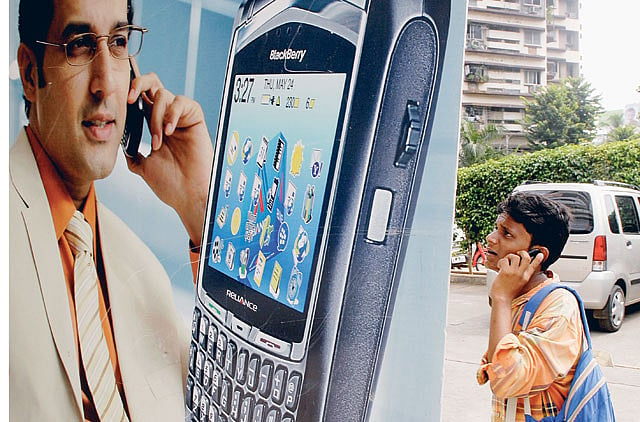The showdown between the Indian government and Research in Motion Ltd (RIM), the Canadian manufacturer of the BlackBerry, has raised difficult questions about electronic snooping and surveillance, while simultaneously resurrecting the old debate about individual privacy versus national security.
The Indian Interior Ministry had warned that it might block electronic mail and messaging services by August 31 if RIM did not make private data accessible to its security agencies. In that case, the million-plus BlackBerry enterprise customers in India would only be able to use their handsets for phone calls and web browsing.
New Delhi has been demanding encryption keys to BlackBerry's servers since the service debuted in India in 2008. Indeed, it is keen that all communications service providers — others include Google and Skype — allow surveillance of their networks. The government's overarching concern is the use of BlackBerry encryption to obscure terrorist activity.
Though RIM is showing signs of relenting, indicating that it will provide a way for Indian authorities to monitor BlackBerry messenger chats by the government-mandated deadline, the larger question is: How valid are New Delhi's demands? And would a blanket ban on all BlackBerry messaging smack of authoritarianism?
Analysts have noted that other security-conscious countries such as China and Russia are fairly satisfied over their intelligence agencies' level of access to BlackBerry communications. So why is India concerned?
To understand New Delhi's perspective, one has to consider the geopolitical dynamics of the region. India is battling insurgencies across entire swathes of its countryside — from Kashmir in the northwest to the far-flung northeast. Heavily encrypted communications, it fears, may be intercepted by militants to jeopardise national security. After all, who could forget the 2008 Mumbai carnage when a handful of mobile and satellite phone-wielding extremists wreaked havoc in India's financial capital, killing 166 people and destroying property worth billions?
Justification
The pro-surveillance lobby feels any government, especially one as vulnerable to terrorist activities as India's, should have access to any data channel that may compromise the country's safety and security. And so, it is not just BlackBerry services, but even voice over Internet protocol services such as Skype and Google Talk that should be prepared to allow access.
While opinion may be divided on the issue, there's no denying that the Indian government's response should be leavened by the legitimate commercial and ethical concerns of the providers of internet telephony.
However, apart from making demands on service providers, the Indian government would also do well to beef up its own internal safety mechanisms to deter the abuse of electronic surveillance. There should be caveats, however. If commercial or personal information obtained in the course of security-related surveillance is misused, then the aggrieved party should be able to take the government to task. The government, on its part, should be able to penalise the stakeholder responsible for the wrongful use of information.
Given the salience of the Indian market in driving growth for any global company that sells goods and services, RIM has relented somewhat on its opposition to allowing state access to its messaging services.
However, the Indian authorities should not take advantage of this economic heft.
Another area of concern which has been highlighted in this tug of war between the establishment and private enterprise is that of individual privacy. The Indian government must seek a clear policy mandate on enhanced monitoring of enterprise internet traffic on the one hand and tackling privacy questions on the other.
All stakeholders must be engaged — the government, private companies and the citizenry. To begin with, the surveyors themselves must be rigorously scrupulous, open to scrutiny and answerable to the relevant parties, should the need arise. The surveillance game is a sensitive one. A high degree of skill, sound ethics and transparent protocols are required if it is to serve a meaningful purpose.
Neeta Lal is a New Delhi-based independent journalist.
Sign up for the Daily Briefing
Get the latest news and updates straight to your inbox
Network Links
GN StoreDownload our app
© Al Nisr Publishing LLC 2026. All rights reserved.
